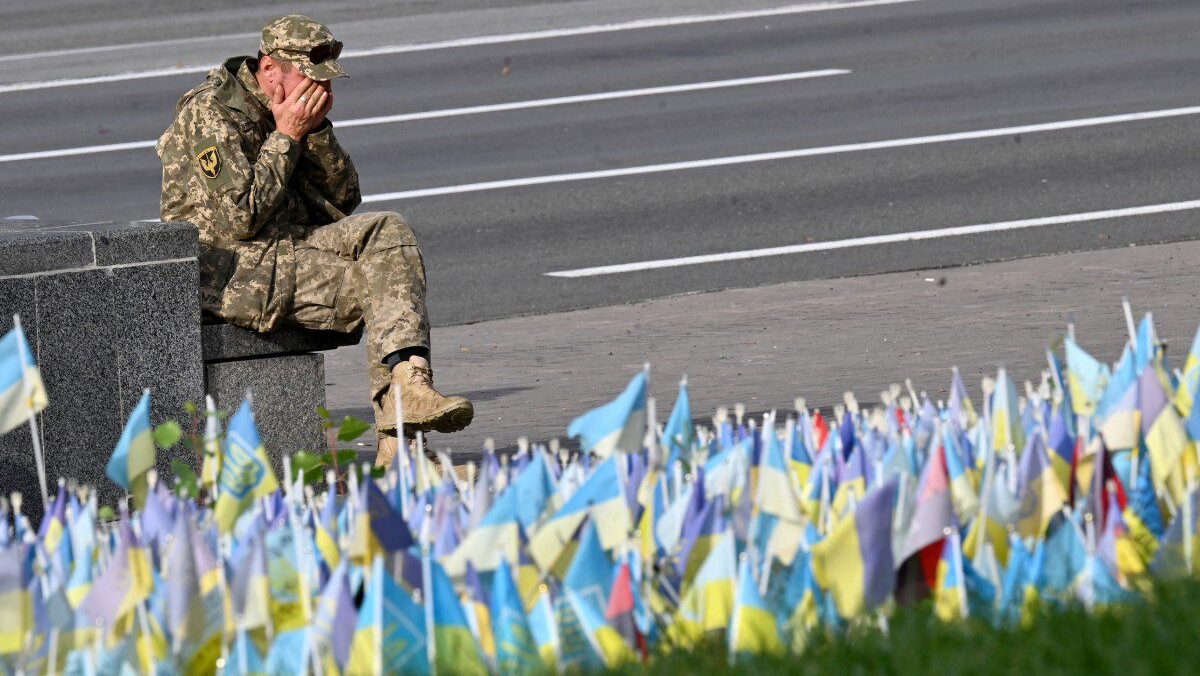
A Ukrainian serviceman reacts as he sits in front of Ukrainian flags symbolising fallen Ukrainian soldiers, at a makeshift memorial site at the Independence Square in Kyiv, on October 26, 2023, amid the Russian invasion of Ukraine.
Photo: Sergei SUPINSKY / AFP
Ukrainian President Volodymyr Zelensky has dismissed suggestions that Ukraine’s counteroffensive against Russia has stalled, and that he should start peace negotiations with Vladimir Putin. “I don’t think that this is a stalemate,” Zelensky said in an interview with NBC News on Sunday, November 5th. He did admit that “everybody gets tired”, and “our steps forward are slow” because of “Russia’s domination in the air” and “the landmines which Russia planted,” nevertheless “we hold the initiative in our hands … our people are mobilised, and our people have a strong desire to win.”
Zelensky’s words come at a time when the counteroffensive launched by the Ukrainian army against Russian troops in the summer has visibly not succeeded, with Ukrainian troops having only managed to advance 17 kilometres. Ukraine is struggling to recruit more soldiers, while Russia is seemingly better able to handle a drawn-out conflict. The war between Israel and Hamas is also shifting attention away from the eastern front and not helping Ukraine’s call for more weapons and ammunition.
Ukrainian forces conducted a successful strike on a Russian shipyard in #Kerch, occupied #Crimea on Nov 4, likely damaging a naval vessel.
— Institute for the Study of War (@TheStudyofWar) November 6, 2023
Ukrainian forces reportedly intensified strikes on rear Russian areas in southern #Ukraine & occupied Crimea Nov 5. https://t.co/hxxDr7qnqQ pic.twitter.com/klB8zUUJJL
To make matters worse for Zelensky, who is intent on winning the war and reclaiming territories seized by Russia, U.S. and European officials have begun talking to the Ukrainian government about possible peace negotiations with Russia, according to NBC News. “The conversations have included very broad outlines of what Ukraine might need to give up to reach a deal,” U.S. officials told the news channel. The discussions are an acknowledgment of the dynamics militarily on the ground in Ukraine and politically in the U.S. and Europe.
There is decreasing enthusiasm with funding Ukraine in the United States, especially among Republicans and their voters, as the campaign for next year’s election heats up. U.S. President Joe Biden wants Congress to pass a $106 billion supplemental spending bill with the bulk of the money going to bolster Ukraine’s defences, and the remainder split among Israel, the Indo-Pacific and border enforcement. The Republican-led U.S. House of Representatives, however, has put forward its own funding plan, which does not include any increase in aid for Ukraine. A Gallup poll released a few days ago shows decreasing support for sending additional aid to Ukraine: 41% of Americans say the U.S. is doing too much to help Kyiv, a 17% point increase compared to three months ago.
The European Union now has two member states—Hungary and Slovakia—that oppose direct military assistance to Ukraine, after Robert Fico formed a government in Bratislava two weeks ago. Italian Prime Minister Giorgia Meloni also recently divulged that there was “a lot of fatigue” in EU circles, and European governments are quietly pushing for a “way out” in resolving the conflict. EU aid to Kyiv runs out in December, and although the European Commission has pledged a €50 billion package for the next four years, Hungary and Slovakia have opposed further funding. The National Bank of Ukraine estimates that international aid will decrease from $45 billion this year to $38.5 billion next year, and $25 billion in 2025.
Ukraine isn’t ready to give up its independence to “terrorist Putin,” President Zelenskyy tells @kwelkernbc on @meetthepress.https://t.co/J7UmSHEnLv pic.twitter.com/GLg2Uy9pie
— NBC News (@NBCNews) November 5, 2023
Reacting to news of Western governments pushing for peace talks, Volodymyr Zelensky told NBC News:
They know my position. That is the position of my country. That is the position of our people. We don’t want to make any dialogue with terrorists. … I am not ready to speak with the terrorists because their word is nothing. Nothing.
At a news conference in Kyiv on Saturday, Zelensky denied that any Western leaders were pressuring him to start negotiations. “For us now to sit down with Russia and talk and give it something—this will not happen,” he said.
Ukraine has repeatedly said it aims to retake all the territory taken by Russia, including Crimea, which was annexed in 2014. Russia currently controls about one-fifth of Ukraine’s internationally recognised territory.
